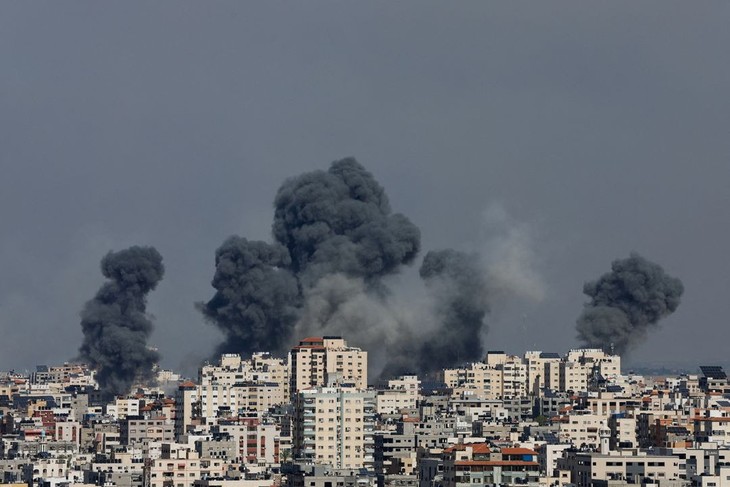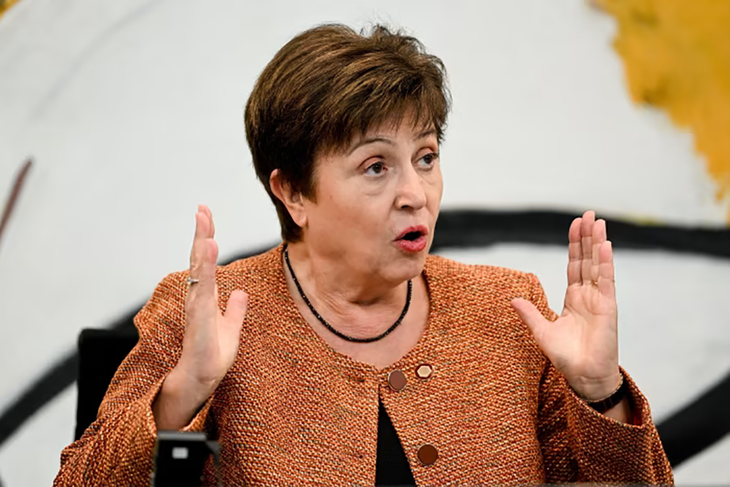(VOVWORLD) - The conflict between Israel and Hamas forces in the Gaza Strip is increasing insecurity in the world. Economists say that right now the conflict has had limited impact on the global economy, but that will change if the conflict widens.
 Smoke rises after an Israeli airstrike in the Gaza Strip on October 7, 2023. (Photo: Reuters) Smoke rises after an Israeli airstrike in the Gaza Strip on October 7, 2023. (Photo: Reuters) |
Fighting in the Gaza Strip has entered the second week. Beyond the human lives lost on both sides and another looming humanitarian crisis, the world is growing concerned about the economic consequences of a wider conflict.
Limited impacts in short term
Last week, worry about the conflict in Gaza drove down stock prices in markets around the world, while gold prices jumped more than 3% on last Saturday and the USD reached its highest level in a week.
Due to the conflict, American energy giant Chevron announced it will stop exporting natural gas through the underground pipeline connecting Israel and Egypt.
World crude oil prices remained flat all week at 90 USD/barrel for North Sea Brent crude and 87 USD/barrel for WTI light, sweet crude.
Ben Cahill, an expert on energy security at the Center for Strategic and International Studies (CSIS), said the relatively mild reaction from the world energy market shows that, at this time, the Gaza conflict has only had a limited impact, because neither Israel nor the Gaza Strip are major oil producers and the conflict is still limited to a narrow geographical area.
Paul Nolte, market strategist at the Murphy & Sylvest Company said major investors around the world are more concerned about whether the US Federal Reserve (FED) will continue to raise interest rates rather than about the fighting in the Gaza Strip.
The Bloomberg newspaper pointed to a similar conflict between Israel and Hamas in 2014 when its impact on global oil prices and the global economy was muted because the fighting was confined to the Gaza Strip. Scenarios outlined by Bloomberg show that if the current conflict does not spread beyond the Gaza Strip, world oil prices will increase at most by 3-4 USD/barrel, the average global inflation will increase 0.1 percentage point, and global GDP will decrease 0.1 percentage point.
 Kristalina Georgieva, IMF Managing Director, warns that a new cloud is darkening over the global economy. (photo: EPA) Kristalina Georgieva, IMF Managing Director, warns that a new cloud is darkening over the global economy. (photo: EPA) |
At the annual meeting of the World Bank and the International Monetary Fund last week in Marrakech, Morocco, WB and IMF leaders were not too worried about the direct impact of the Gaza conflict. Kristalina Georgieva, IMF Managing Director, said the conflict does increase the insecurity of the world economy, which is already fragile for other reasons.
She has warned that the Middle East conflict is a “new cloud darkening” over the global economy. Kristalina Georgieva said officials were closely monitoring developments in the region amid an escalating conflict that has pushed up oil prices and rattled financial markets.
Long-term instability
Many economists believe the situation will be different if the conflict is not contained. Oil prices rose 6% last on Friday with investors on edge about escalating tensions in the Middle East.
In the worst scenario, if the conflict in Gaza gets out of control, Bloomberg Economics estimates oil prices could soar to 150 USD a barrel and inflation to 6%, pulling the world economic growth 1 percentage point next year. So, global GDP growth would drop to about 1.7%, the lowest level since 1982 if you omit the COVID-19 pandemic and the 2008 financial crisis. IMF chief economist Pierre-Olivier Gourinchas said that whenever oil prices increase 10%, global inflation increases 0.4 percentage points and global growth loses 0.15 points.
WTO Director-General Ngozi Okonjo-Iweala said: "There is uncertainty about whether this is going to spread further to the whole region, which could impact very much on global economic growth," she said. "We hope it will end because it does create this uncertainty. It's another dark cloud on the horizon."
Many economists warn of macroeconomic insecurity in the world economy. Brendan McKenna, a global economist at Wells Fargo, warns that the Israel-Gaza conflict, like COVID-19 and the Ukraine conflict, feeds deglobalization and threatens the fragile economic recovery of some regions.